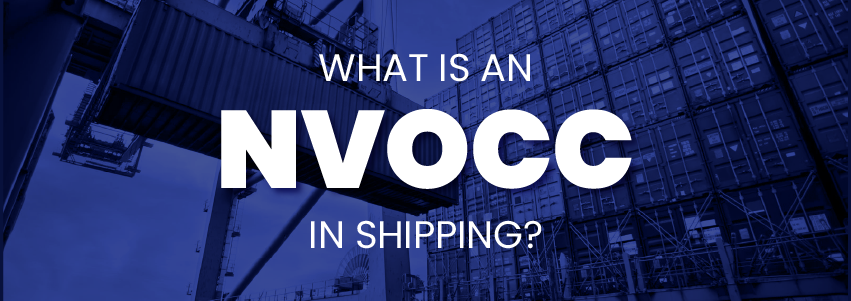What Is an NVOCC in Shipping?
Table of Contents
International shipping depends on different entities which work together to transport merchandise between countries. The shipping industry relies heavily on NVOCC which stands for Non-Vessel Operating Common Carrier as one of its essential components. The NVOCC meaning requires knowledge from exporters and importers and logistics experts who need to enhance their supply chain operations.
An NVOCC shipping company does not own vessels but operates like a carrier by issuing bills of lading, booking container space, and managing the flow of goods. This makes the NVOCC meaning in logistics central to efficient global trade.
What is an NVOCC Company?
An NVOCC company functions as a connection point between shipping companies and vessel-operating carriers. The business model of these companies involves buying shipping capacity from lines and then selling it to customers at competitive rates so businesses of all sizes can access affordable freight services.
Their services include:
- Consolidating shipments for efficiency.
- Issuing their own bills of lading.
- Offering NVOCC tracking tools for visibility.
- Providing inland logistics and documentation support.
Businesses gain operational flexibility and reliability through NVOCC operations which eliminate their need to establish direct contracts with vessel owners.
List of NVOCC Companies in India
India is one of the world’s busiest trade markets, and the presence of many NVOCC companies highlights the importance of this model. In India, these companies:
- Handle containerized cargo across Asia, the Middle East, Africa, and Europe.
- Provide shippers with customized NVOCC logistics solutions.
- Use advanced platforms for cargo updates and monitoring.
Instead of focusing on a list of NVOCC, what matters is how widespread and competitive this market is, showing the strength of India’s role in global supply chains.
List of NVOCC Companies in Mumbai
Mumbai, being India’s largest port hub, hosts a dense concentration of NVOCC companies. These operators:
- Manage shipments through major container terminals.
- Support consolidation for exporters dealing with smaller volumes.
- Offer efficient NVOCC operations that connect Mumbai to almost every global route.
A detailed NVOCC companies list from Mumbai would be long, but what’s important is the city’s role as a central gateway where NVOCC providers link Indian trade to the world.
What is an NVOCC Agent?
An NVOCC agent is a representative that ensures smooth operations at local levels. Agents:
- Work with shippers on booking and documentation.
- Negotiate with carriers on behalf of the NVOCC.
- Coordinate customs clearance and inland delivery.
The NVOCC shipping company depends on these representatives to deliver prompt and expert assistance to their customers.
What is an NVOCC License?
A company needs an NVOCC license to become a recognized Non-Vessel Operating Common Carrier. The NVOCC license enables the company to create bills of lading and handle shipments while functioning as a carrier in logistics operations.
What are NVOCC License Requirements?
Common NVOCC license requirements include:
- Proof of financial stability and security.
- Adequate infrastructure and trained staff.
- Container leasing and handling arrangements.
- Compliance with global maritime standards.
The requirements help establish trust and accountability in NVOCC operations which enables shippers to trust their logistics partner.
NVOCC Examples and Industry Overview
NVOCC in shipping can be observed in nearly every global trade lane. These companies deliver essential container transport services by linking Asia to Europe and emerging markets to established business centers.
A small exporter who lacks enough cargo to fill a container will use NVOCC services to combine shipments from various shippers into a single container for optimized space usage and documentation management. The efficient operations of NVOCC logistics enable businesses to compete effectively in international markets.
OPCA members who offer NVOCC operations together with project cargo expertise provide complete service for both standard containerized freight and complex specialized transportation requirements.
What Is the Role of an NVOCC Carrier?
An NVOCC carrier functions like a vessel operator yet it operates without vessel ownership. The NVOCC carrier must perform all duties that vessel operators handle.
- Acting as a carrier to shippers, offering its own bill of lading.
- Acting as a shipper to vessel operators, booking container slots.
- Managing end-to-end services such as NVOCC tracking and inland logistics.
The dual role of NVOCCs positions them as essential entities in contemporary trade operations.
NVOCC vs Freight Forwarder: What is the difference?
The two terms exist as separate entities although people tend to mix them up.
- An NVOCC shipping company creates its own bill of lading while taking responsibility for carrier duties and handling all cargo operations.
- A freight forwarder takes care of transportation arrangements but maintains no carrier status.
NVOCCs offer shippers better protection during specific situations because they maintain direct responsibility for cargo accountability.
NVOCC vs VOCC: What is the difference?
The shipping industry operates through two main types of carriers, which include VOCC (Vessel Operating Common Carrier) and NVOCC (Non-Vessel Operating Common Carrier).
- VOCC (Vessel Operating Common Carrier) operates ships while controlling schedules and port operations.
- NVOCC operates without vessel ownership yet functions as a carrier by acquiring shipping capacity for resale to customers.
The two entities maintain essential positions in logistics operations, although they function in distinct ways.
What is Difference Between NVOCC and Shipping Line
A shipping line operates as a VOCC which controls vessels and establishes shipping routes and schedules. The NVOCC shipping company functions as a space lessee which provides carrier services to shippers through its added benefits of consolidation and flexible NVOCC logistics.
Frequently Asked Questions About NVOCC
What does NVOCC mean in shipping?
A Non-Vessel Operating Common Carrier (NVOCC) operates as a carrier service provider without maintaining ownership of vessels.
What is an example of a NVOCC?
A standard NVOCC functions as a company which unites multiple shipments under one bill of lading while handling worldwide transportation. The services of OPCA members include these operational functions.
Can NVOCC issue bill of lading?
An NVOCC shipping company maintains the authority to create its own house bill of lading which establishes its status as the carrier for that specific transaction.
What are the benefits of NVOCC?
- Flexible space booking.
- Cost efficiency through consolidation.
- Professional NVOCC tracking systems.
- Carrier-level responsibility for cargo.
OPCA Members as Project Cargo Experts
Standard shipping operations through NVOCCs remain essential for containerized trade yet project cargo demands specialized knowledge. The Overseas Project Cargo Association (OPCA) members demonstrate exceptional proficiency in handling project cargo freight forwarding services for oversized and heavy complex shipments.
OPCA members are globally recognized as project cargo freight forwarders, handling oversized, heavy, and complex shipments. They combine technical planning with logistics experience, ensuring smooth delivery of even the most challenging projects.
Companies that partner with OPCA members obtain access to specialized expertise together with worldwide business connections and dependable solutions which extend beyond typical shipping operations.
_logo.webp)



